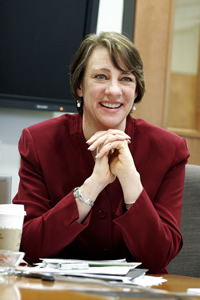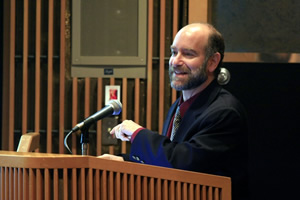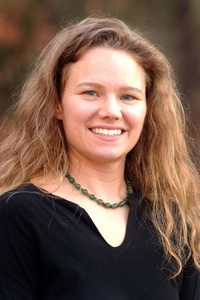
Environmental Factor, January 2009, National Institute of Environmental Health Sciences
NIEHS Represented at EcoHealth Conference
By Eddy Ball
January 2009



The Yucatan Peninsula city of Merida served as the venue for the International EcoHealth Forum 2008 December 1-5. Hosted by Mexico’s National Institute of Public Health and sponsored in part by NIEHS, the conference provided a forum for exchange of the latest information on ecological issues, including land use patterns, biodiversity loss, and conservation programs and their relationships to human health.
NIEHS played a prominent role at the meeting (http://www.insp.mx/ecohealth2008/index.php) ![]() through a panel discussion on Energy and Health. Chaired by NIEHS Associate Director Sharon Hrynkow, Ph.D. (http://www.niehs.nih.gov/about/od/associate/index.cfm), the Institute’s lead on climate change, the panel session focused on links between energy strategies and use and public health. Joining the NIEHS in supporting the panel was the United Nations Foundation.
through a panel discussion on Energy and Health. Chaired by NIEHS Associate Director Sharon Hrynkow, Ph.D. (http://www.niehs.nih.gov/about/od/associate/index.cfm), the Institute’s lead on climate change, the panel session focused on links between energy strategies and use and public health. Joining the NIEHS in supporting the panel was the United Nations Foundation.
In her opening comments, Hrynkow remarked on the glaring inequities evident in energy use and availability worldwide. “2.4 billion people in the poorer parts of the world do not have access to clean energy,” she explained, “while those in wealthier nations use a disproportionate share of the world’s energy resources.”
Pointing to the growing middle class in emerging economies of China, India and other nations and the attendant demands for goods, services and energy, Hrynkow cautioned that the world’s energy path is unsustainable. As energy policies evolve, she continued, "It will be critical to understand health impacts, both positive and negative, of the energy choices societies are about to make."
The distinguished panel of speakers included Jonathan Patz, M.D. (http://www.sage.wisc.edu/people/patz/patz.html) ![]() , professor at the Nelson Institute for Environmental Studies at the University of Wisconsin - Madison, who addressed the health and economic co-benefits of energy choices such as walking and biking. He was joined by NIEHS Laboratory of Molecular Toxicology Postdoctoral Fellow Julia Gohlke, Ph.D., who described a holistic framework for assessing a range of energy choices and used a case study of coal-fire power plants to identify gap areas in our knowledge base.
, professor at the Nelson Institute for Environmental Studies at the University of Wisconsin - Madison, who addressed the health and economic co-benefits of energy choices such as walking and biking. He was joined by NIEHS Laboratory of Molecular Toxicology Postdoctoral Fellow Julia Gohlke, Ph.D., who described a holistic framework for assessing a range of energy choices and used a case study of coal-fire power plants to identify gap areas in our knowledge base.
A third panelist, London School of Hygiene and Tropical Medicine Reader in Environmental Epidemiology Paul Wilkinson, M.D. ( http://www.lshtm.ac.uk/prospectus/profiles/wilkinson.html) ![]() , shared results of a modeling study in London that demonstrated that local programs to decrease greenhouse gas emissions would not be sufficient to improve health due to regional weather patterns that deposit particulate matter and other factors broadly. He called for concerted mitigation efforts at the local, regional and global level.
, shared results of a modeling study in London that demonstrated that local programs to decrease greenhouse gas emissions would not be sufficient to improve health due to regional weather patterns that deposit particulate matter and other factors broadly. He called for concerted mitigation efforts at the local, regional and global level.
In addition to the panel session hosted by Hrynkow, the nearly weeklong conference also featured pre-forum events on November 30 and December 1, when attendees were welcomed formally by the governor of Yucatan and the Mexican ministers of Health and Ecology. The next three days offered participants full-day symposia, oral and multimedia presentations, and poster sessions structured around the themes of each day’s plenary session. On the final day of the forum, participants who stayed over at the conference were able to enjoy ecological site visits to Celestúm, Yaxcabá or San Felipe.
"Study Examines Women's Household Exposure Experiences..." - previous story ![]()
![]() next story - "WE ACT Conference to Address Climate Justice..."
next story - "WE ACT Conference to Address Climate Justice..."
January 2009 Cover Page



